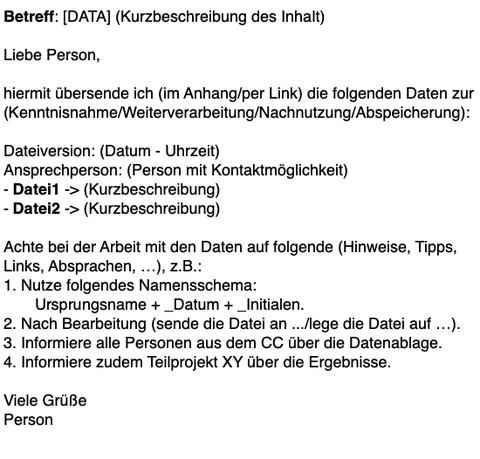Nov 28, 2022
Sending research data by email - It's a NO-GO! Or is it?
Research groups and joint projects occasionally ask whether sending research data via email is acceptable in terms of “good” research data management. It can become a problem that:
- Research data have been taken out of context and the context has to be added or submitted later (e.g. documentation or renaming of files).
- There is no option for synchronization and therefore duplicates are created with different version histories.
- It is frequently unclear what the other person should or is permitted to do with the data.
Prerequisites for sending data via email
Sending data via email can indeed be useful, for instance if multiple of the following conditions apply:
- Physical or time difference (international joint projects, teleworking)
- Technical difficulties (e.g. VPN requirement) (“It’s too much trouble”)
- Urgency (“This just has to be taken care of quickly”)
- Size of the file (“The file isn’t that large”)
- Delivery is expected (“That’s how we discussed it”)
What should you be aware of?
Emails have the advantage of automatically recording the delivery of the data. This entails a certain degree of auditing assurance, since it is clear to everyone involved who received which version of what data. To use this record to the fullest, we recommend including a selection of the following information in the body of your email:
Best practices (see figure)
Including [DATA] in the subject enables quick searching or automated sorting in the email program.
- What is the recipient expected to do and who is the contact?
- What files are being sent? Which version?
- What knowledge about the data is relevant for the sender or the recipient to have?
- Where and in what format should new versions be saved?
- Who should be informed about results and progress? How?
Finally, it is always useful to check whether the email with research data has been signed and encrypted.
Do you have further questions on this topic or would you like more detailed information on specific elements?
We would be glad to hear from you. Please contact us at Service Center Research Data by email or book anappointment.


